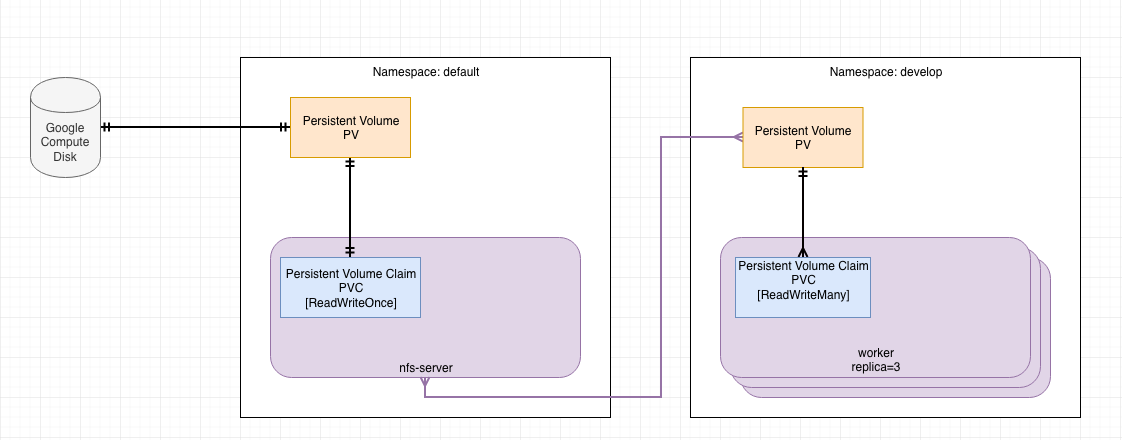kind: Service
apiVersion: v1
metadata:
name: nfs-server
spec:
ports:
- name: nfs
port: 2049
- name: mountd
port: 20048
- name: rpcbind
port: 111
clusterIP: None
selector:
app: nfs-server
---
apiVersion: apps/v1
kind: StatefulSet
metadata:
name: nfs-server
spec:
serviceName: "nfs-server"
podManagementPolicy: "Parallel"
replicas: 1
selector:
matchLabels:
app: nfs-server
template:
metadata:
labels:
app: nfs-server
spec:
containers:
- name: nfs-server
image: k8s.gcr.io/volume-nfs:0.8
ports:
- name: nfs
containerPort: 2049
- name: mountd
containerPort: 20048
- name: rpcbind
containerPort: 111
securityContext:
privileged: true
volumeMounts:
- mountPath: /exports
name: provision-pvc
volumeClaimTemplates: # a new gcloud persistent disk will be created automatically
- metadata:
name: provision-pvc
spec:
accessModes: [ "ReadWriteOnce" ]
resources:
requests:
storage: 1GiapiVersion: v1
kind: PersistentVolume
metadata:
name: nfs
spec:
capacity:
storage: 1Mi
accessModes:
- ReadWriteMany
nfs:
server: nfs-server.default.svc.cluster.local
path: "/"
---
apiVersion: v1
kind: PersistentVolumeClaim
metadata:
name: nfs
spec:
accessModes:
- ReadWriteMany # we're able to do this because the backend is a NFS server and not a compute engine disk (supports read by many only)
storageClassName: "" # only able to bound to PVs which don't define a class
resources:
requests:
storage: 1Mi # this is not important, because the PV lookup is mainly concerned with the 'accessModes' whenNOTE: PVs are in the global scope (not namespace scoped), but once bound to a PVC (namespace scoped), they are not usable by other PVCs from other namespaces.
In the example below we see two, global PVs (pointing to the same NFS server) and two PVCs. One PVC is in the default namespace and the other one is in the nfs-work namespace.
$ kubectl get pv
NAME CAPACITY ACCESS MODES RECLAIM POLICY STATUS CLAIM STORAGECLASS REASON AGE
nfs 1Mi RWX Retain Bound default/nfs 21m
nfs-work-ns 1Mi RWX Retain Bound nfs-work/nfs-work-ns 7m
$ kubectl get pvc
NAME STATUS VOLUME CAPACITY ACCESS MODES STORAGECLASS AGE
nfs Bound nfs 1Mi RWX 21m
$ kubectl get pvc -n nfs-work
NAME STATUS VOLUME CAPACITY ACCESS MODES STORAGECLASS AGE
nfs-work-ns Bound nfs-work-ns 1Mi RWX 7m
apiVersion: extensions/v1beta1
kind: Deployment
metadata:
name: nfs-worker
spec:
replicas: 2
selector:
matchLabels:
app: nfs-worker
template:
metadata:
labels:
app: nfs-worker
spec:
containers:
- image: busybox
command:
- sh
- -c
- 'while true; do date > /mnt/index-`hostname`.html; hostname >> /mnt/index-`hostname`.html; sleep $(($RANDOM % 5 + 5)); done'
imagePullPolicy: IfNotPresent
name: busybox
volumeMounts:
- name: nfs
mountPath: "/mnt"
volumes:
- name: nfs
persistentVolumeClaim:
claimName: nfsAfter applying the above, you can list the contents of the NFS drive, by accessing one of the workers.
kubectl get pods
NAME READY STATUS RESTARTS AGE
nfs-server-0 1/1 Running 0 1m
nfs-worker-5cc569cb87-lrmch 1/1 Running 0 1m
nfs-worker-5cc569cb87-mwtzh 1/1 Running 0 1m
kubectl exec -ti nfs-worker-5cc569cb87-lrmch -- ls /mnt/
index-nfs-worker-5cc569cb87-lrmch.html
index-nfs-worker-5cc569cb87-mwtzh.html
index.html
You should see files generated from both workers.
When there are multiple NFS servers running, you probably want to target them specifically from an app eg.
media-app > media-nfs-server
That's doable by defining labels on the PV and matching them on a PVC.
# PV
metadata:
name: media-pv
labels:
storage: media
# PVC - media-pvc
spec:
selector:
matchLabels:
storage: media
And then on the PodSpec:
spec:
template:
spec:
containers:
- ...
volumeMounts:
- name: nfs
mountPath: "/mnt"
volumes:
- name: nfs
persistentVolumeClaim:
claimName: media-pvc
